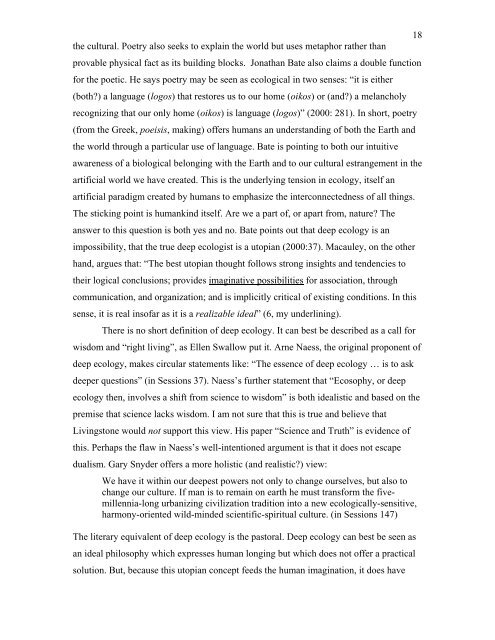"Symbiosis or Death": - Rhodes University
"Symbiosis or Death": - Rhodes University
"Symbiosis or Death": - Rhodes University
Create successful ePaper yourself
Turn your PDF publications into a flip-book with our unique Google optimized e-Paper software.
18<br />
the cultural. Poetry also seeks to explain the w<strong>or</strong>ld but uses metaph<strong>or</strong> rather than<br />
provable physical fact as its building blocks. Jonathan Bate also claims a double function<br />
f<strong>or</strong> the poetic. He says poetry may be seen as ecological in two senses: “it is either<br />
(both?) a language (logos) that rest<strong>or</strong>es us to our home (oikos) <strong>or</strong> (and?) a melancholy<br />
recognizing that our only home (oikos) is language (logos)” (2000: 281). In sh<strong>or</strong>t, poetry<br />
(from the Greek, poeisis, making) offers humans an understanding of both the Earth and<br />
the w<strong>or</strong>ld through a particular use of language. Bate is pointing to both our intuitive<br />
awareness of a biological belonging with the Earth and to our cultural estrangement in the<br />
artificial w<strong>or</strong>ld we have created. This is the underlying tension in ecology, itself an<br />
artificial paradigm created by humans to emphasize the interconnectedness of all things.<br />
The sticking point is humankind itself. Are we a part of, <strong>or</strong> apart from, nature? The<br />
answer to this question is both yes and no. Bate points out that deep ecology is an<br />
impossibility, that the true deep ecologist is a utopian (2000:37). Macauley, on the other<br />
hand, argues that: “The best utopian thought follows strong insights and tendencies to<br />
their logical conclusions; provides imaginative possibilities f<strong>or</strong> association, through<br />
communication, and <strong>or</strong>ganization; and is implicitly critical of existing conditions. In this<br />
sense, it is real insofar as it is a realizable ideal” (6, my underlining).<br />
There is no sh<strong>or</strong>t definition of deep ecology. It can best be described as a call f<strong>or</strong><br />
wisdom and “right living”, as Ellen Swallow put it. Arne Naess, the <strong>or</strong>iginal proponent of<br />
deep ecology, makes circular statements like: “The essence of deep ecology … is to ask<br />
deeper questions” (in Sessions 37). Naess’s further statement that “Ecosophy, <strong>or</strong> deep<br />
ecology then, involves a shift from science to wisdom” is both idealistic and based on the<br />
premise that science lacks wisdom. I am not sure that this is true and believe that<br />
Livingstone would not supp<strong>or</strong>t this view. His paper “Science and Truth” is evidence of<br />
this. Perhaps the flaw in Naess’s well-intentioned argument is that it does not escape<br />
dualism. Gary Snyder offers a m<strong>or</strong>e holistic (and realistic?) view:<br />
We have it within our deepest powers not only to change ourselves, but also to<br />
change our culture. If man is to remain on earth he must transf<strong>or</strong>m the fivemillennia-long<br />
urbanizing civilization tradition into a new ecologically-sensitive,<br />
harmony-<strong>or</strong>iented wild-minded scientific-spiritual culture. (in Sessions 147)<br />
The literary equivalent of deep ecology is the past<strong>or</strong>al. Deep ecology can best be seen as<br />
an ideal philosophy which expresses human longing but which does not offer a practical<br />
solution. But, because this utopian concept feeds the human imagination, it does have

















